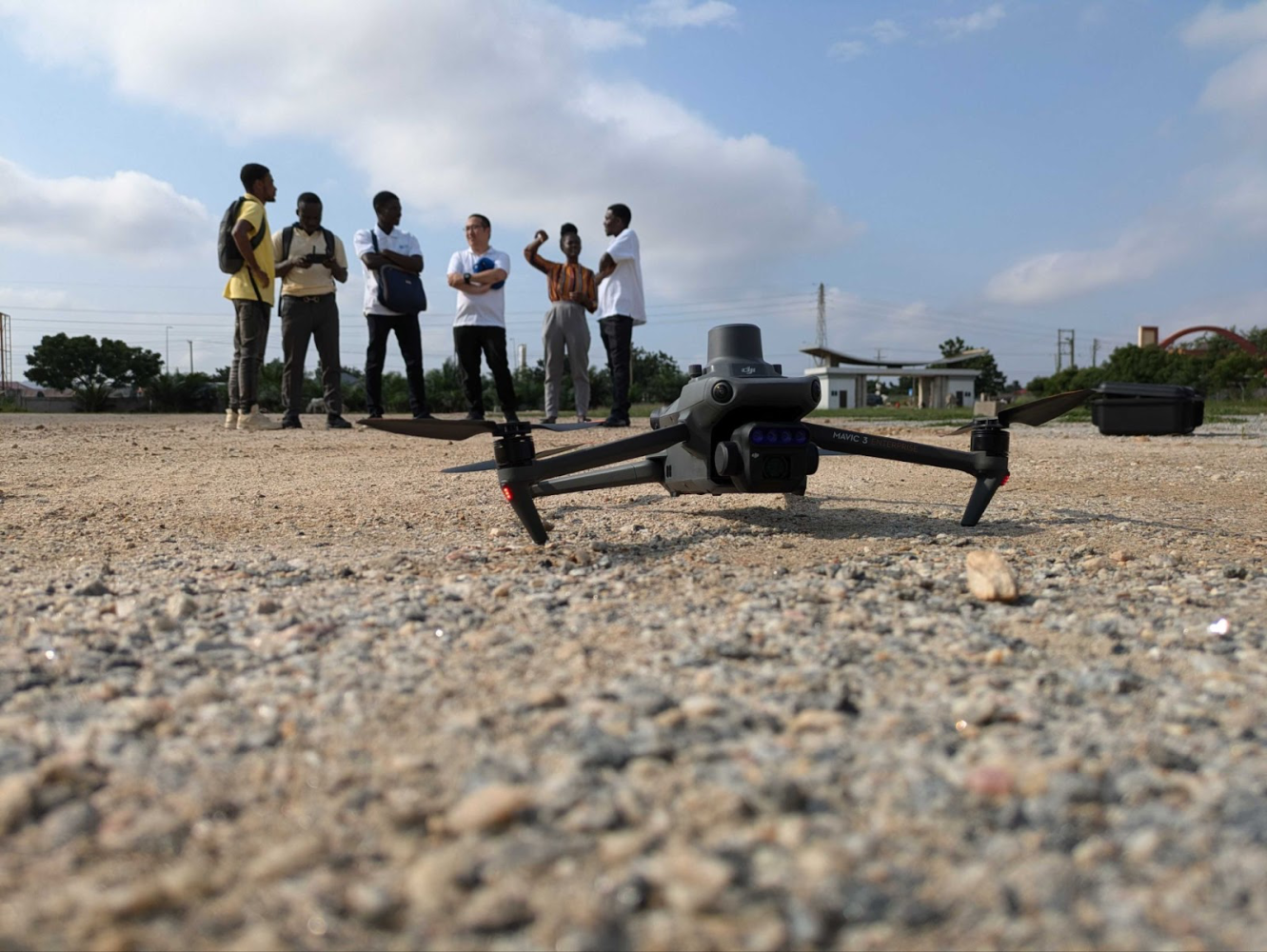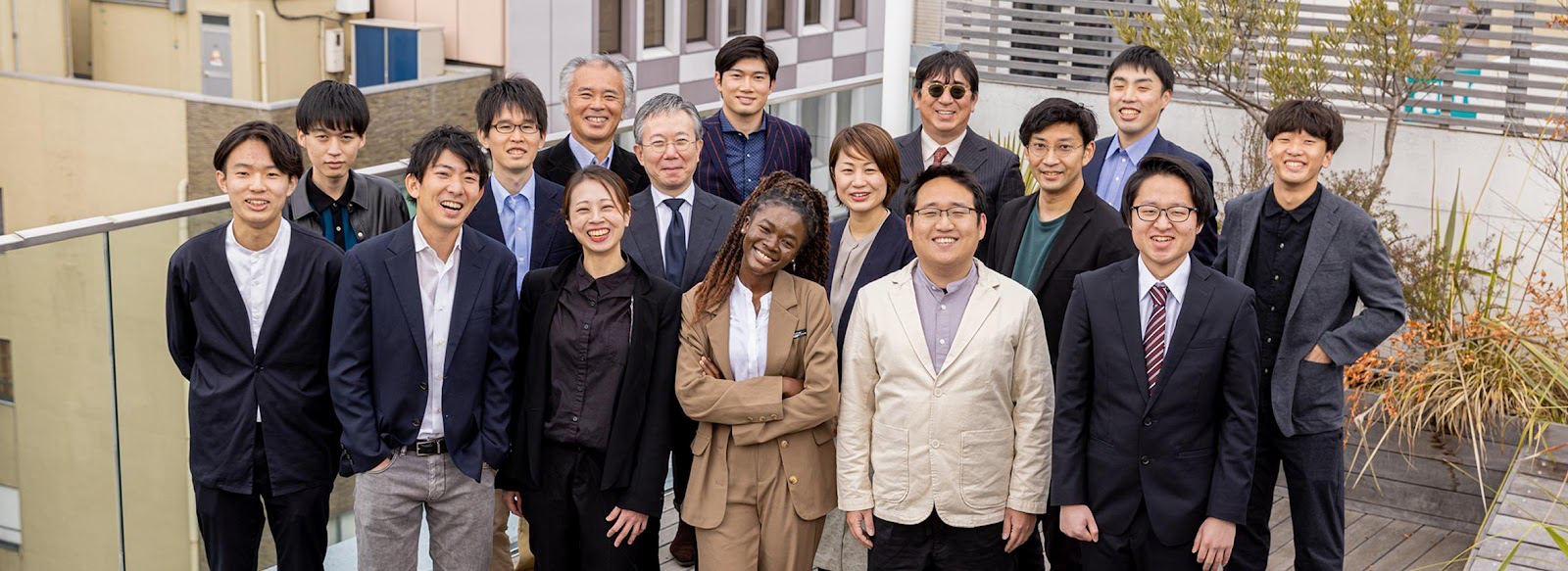Fantastic Entrepreneurs in Japan: Yosuke Kaneko and the Fight Against Malaria from Tokyo to Ghana
This is a story of what happens when you dare to quickly embrace new opportunities, and go with the particular flow that life gives you.
“Hi, Tobias!” Yosuke Kaneko greets me with a warm smile. “How are you?” Yosuke has recently relocated to London, but his mind seems to be simultaneously in Japan, Africa, and, in a most inspiring way, in the cloud.
Born and raised in Japan, I first met Yosuke during a Japan-based acceleration program that I supported as an advisor back in 2024. To me, it was obvious from the get-go that Yosuke had picked an incredibly interesting mission to tackle, one that requires a unique combination of experience and expertise in three very different disciplines:
micro mobility (more specifically, drones)
hydrology (i.e. "the scientific study of the movement, distribution, and management of water on Earth and other planets")
and business to government ("B2G") sales
Yosuke, together with his team at SORA Technology, combines deep sector knowledge with the kind of pragmatic approach that you only get from real life experience, and it is the sort of package that I would very much like to support. So, if you are at all interested in how Japanese entrepreneurs are collaborating with the Gates Foundation to combat malaria in Africa, do read on!
From Accenture to Africa
“I studied economics at Keio University,” he begins. “It’s a respected private university, but my major didn’t really point toward working with drones or fighting malaria. A close friend of mine, my tennis doubles partner from junior high school, had a dream to start a business. His father was a successful entrepreneur who had left SONY to build a major company. My friend told me: 'I’ll be the president. You'll be the vice president. We need to learn accounting!' That conversation drove me to study economics."
Tragically, in his second year of university, Yosuke's friend passed away in a car accident. “It changed everything. Later, I spoke to my friend's father, and he told me: Instead of my son, if you could work at Accenture and carry that knowledge forward, it would be a good story.” Thus, after graduating, he joined Accenture’s strategy division, working on finance projects for banks and securities firms. At that time, nothing in his path hinted at a future combating vector-borne diseases in the Global South.
Three years later, fate intervened again (and hang on, for now things will develop quickly): “I saw a drone on TV. I thought: This is it. I wanted to become a drone pilot. There weren’t any good places to train in Japan, so I decided I should create one myself.” By chance, at this very same time, a former colleague from Accenture invited him to join a drone startup, and, naturally, Yosuke said yes to the offer to join as Chief Strategy Officer.
"We had solved the problem of transportation with the drone, but we did not have enough supplies to transport!"
From Delivery Drones to Disease Control
“I was asked to help deliver vaccines to newborns in Africa. The hepatitis B vaccine has to be given within few weeks of birth. That’s how I found myself in Senegal, Benin, and DRC, working with a French research institute and later supporting a UNICEF-led initiative in Sierra Leone.”
Seeing the challenges up close in Africa left a lasting impression. But when back in Japan, Yosuke felt confined. “There are too many rules. Too many roads. Nowhere to fly.” Sensing what must have been a fair portion of frustration at the time, Yosuke explains that this chapter had a significant impact on his thinking: “Technology should serve people. It’s not about building gadgets. It’s about social implementation.”
An opportunity to embrace this new way of looking at technology arose when Yosuke was asked to collaborated with JAXA: Japan Aerospace Exploration Agency (the Japanese space agency) to implement drone-based crisis response systems for when natural disasters strike in Japan. But even then, his heart remained in Africa, and he finally decided to follow his instinct, and found his own platform for deploying technology for a greater good. The result: SORA Technology, founded with an admirable mission to use drones and AI to solve global health challenges.
“At first, we focused on drone delivery. But when I went to Sierra Leone in 2021-2022 for a medical delivery project with UNICEF, I realized something shocking: there were no medical items to deliver! We had solved the problem of transportation with the drone, but we did not have enough supplies to transport!”
Realizing that there was a great need to prioritize how to best use the limited resources that were available, he turned to the people on the ground. “We asked what the biggest health issue was. Everyone said the same thing: malaria.”
“From the air, we can detect water bodies that are likely mosquito breeding sites.”
Seeing the Unseen: Mapping Malaria from the Sky
Yosuke and his team pivoted. “Shortages meant that we couldn't deliver enough drugs, but we realized that we could maximize the impact of the available drugs by pinpointing the most important target areas for drug deployment,” he explains. “From the air, we can detect water bodies that are likely mosquito breeding sites.”
His Vice-CEO, Masaki Umeda, happened to be a specialist in hydrology, a background that proved crucial. “He understands ponds better than anyone,” Yosuke smiles. Masaki hadn’t even intended to join the company. “He found us by mistake. He was looking for work in the Global South, saw our website, and sent a message. We were lucky.”
Together, they developed a model that combined drones, airborne sensors, and environmental science to detect high-risk zones for malaria. “We read scientific papers, but we didn’t stop there. We also spoke with local people. We asked, ‘Does this make sense in your environment?’” The team identified key variables (water depth, temperature, terrain) that increased the likelihood of mosquito breeding, and they built their detection model around these features.
Their work builds on a growing interest in Larval Source Management (LSM) — an approach that targets mosquito breeding sites directly by managing the water bodies where larvae develop. While LSM has gained attention in recent years for its effectiveness, the traditional method relies on manually searching for puddles and spraying them one by one. “It sounds simple,” Yosuke says, “but it’s incredibly expensive and hard to scale.”
By using drones and AI to identify high-risk breeding sites from the air, SORA’s model dramatically reduces the cost and complexity of LSM. “We don’t have to spray every puddle,” he adds. “We can focus on the ones that matter.” SORA moved fast. In April 2022, they began piloting the system in Sierra Leone. By May, they had pitched the new idea on site. In June, they tested it. And in August, Yosuke was presenting the concept to the Gates Foundation.
“Bill Gates said, ‘This is a very cool example.’ That moment was huge.”
But that huge momentum was years in the making. Back in 2017, Yosuke had visited ZipLine, the now-famous drone delivery company. “They told me the key was working closely with not only global south but also global north players. That conversation stuck with me. Since then, I’ve been repeating the same message: innovation will come from the Global South, where social implementation isn’t optional — it’s urgent.”
By using drones and AI to identify high-risk breeding sites from the air, SORA’s model dramatically reduces the cost and complexity of LSM.
A Business Model with Purpose
“This isn’t just aid. It’s business,” Yosuke says. “We work mostly with government ministries, but also private sector clients like energy and mining companies who need to protect their employees.”
The business model is straightforward. “About 90% of our clients are ministries of health,” he explains. “The other 10% are companies that operate in high-risk areas and want to protect their teams from malaria.”
SORA charges about 3 euros per person served. “If a region has a million people, that’s 3 million euros in revenue,” Yosuke explains. “Our main costs are spraying and drone operations.” In Ghana, they’ve already proven the model at a small scale. Now, they’re working to expand across sub-Saharan Africa.
SORA is also collaborating with the World Health Organization (WHO) to standardize the model. “We’re not trying to keep this for ourselves,” Yosuke says. “It’s about systems, not silos. We want to empower other companies and NGOs to use the same structure. That’s the fastest way to impact.”
SORA Malaria Control, provided by SORA Technology, combines aerial photography data from in-house developed fixed-wing drones, with multiple AI technologies, to efficiently identify and manage puddles with a high risk of serving as habitats for mosquito larvae.
Why the UK? And What About Japan?
Yosuke recently relocated to London. “80% personal, 20% professional,” he laughs. But the move also made strategic sense: the UK is home to strong academic partners in tropical disease, major donors and development organizations, and is one of SORA’s target exit markets.
“Japan has amazing technology,” he says. “But the startup ecosystem is difficult. IPOs are small. Investors want low-risk, domestic plays. That limits the potential.”
He and I both share a belief: Japan could become a global startup hub — but only if confidence grows. “Japanese entrepreneurs tend to produce world-class solutions,” I tell Yosuke. “But few people have global experience. Without that, they don’t believe they can succeed abroad. And if investors only support predictable, local businesses, it becomes a vicious cycle.”
Yosuke nods in agreement, adding: “Japan has very low labor costs but very high education. The workforce is stable and hardworking. If we use those differences well, we can build great businesses. But the startup culture needs to become more global.”
The Bridge Between Worlds
“The best shortcut? Mixed teams,” Yosuke says. “Combine global experience with Japanese excellence. That’s how you create world-class companies.”
We share the belief that there’s a deep, underutilized alignment between Japan and Europe.
“From space,” I suggest, “if an alien looked down, they might wonder: why aren’t Japan and Europe working more closely together? We share so much — values, craftsmanship culture, long-term thinking. That bridge needs more traffic.”
Yosuke nods in agreement. “Exactly. And the best way to build that bridge is by working together.”
“The best shortcut? Mixed teams,”
What Comes Next?
“I want to connect with the Nordic countries,” he says. “Sweden, Norway, Denmark — they really care about climate and health. We’re aligned.”
Yosuke points to Vestergaard , a Swiss-Nordic company that produces malaria nets and health tools, as a model partner. “They’re a perfect example of the kind of company we want to collaborate with. Together, we can offer more holistic responses.”
He welcomes connections with investors, public health institutions, and digital health companies that are serious about real-world outcomes.
“AI is powerful. But so is human-centered work. The future of healthcare — especially in the Global South — will need both.”
SORA is already building that ecosystem. “We’ve started collaborating with medicine suppliers, mosquito net manufacturers, and logistics companies. This isn’t just a tech solution — it’s a collaborative platform for public health.”
If you want to support SORA or connect with Yosuke, now is the time. He’s not just imagining a better future — he’s actively building it. I will do my part to try and help, and I hope that his story may inspire you to do the same. If you would like to connect with Yosuke, shoot me a message and I will introduce you, or contact him directly at the email below.
Talk more soon,
Tobias






